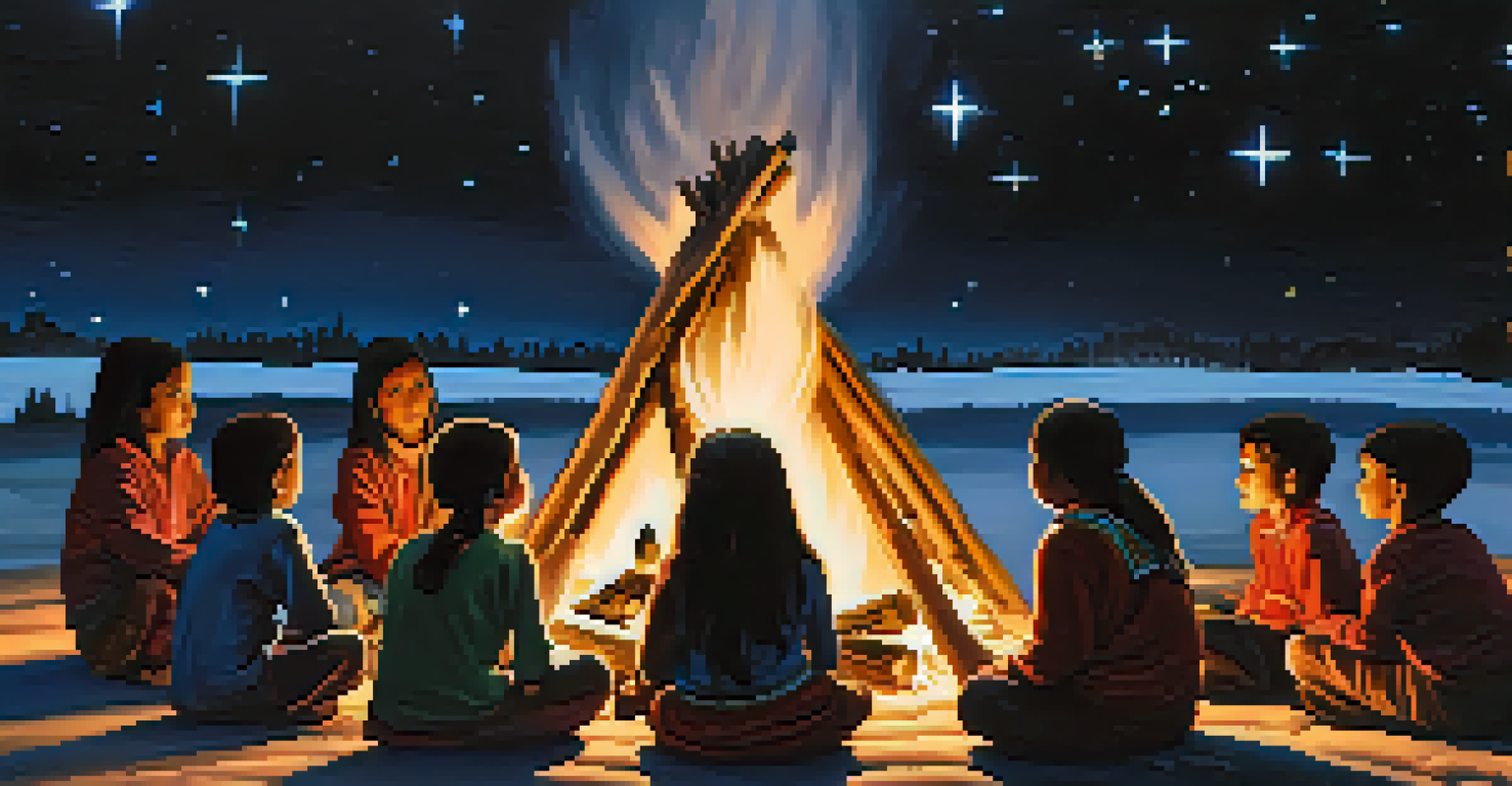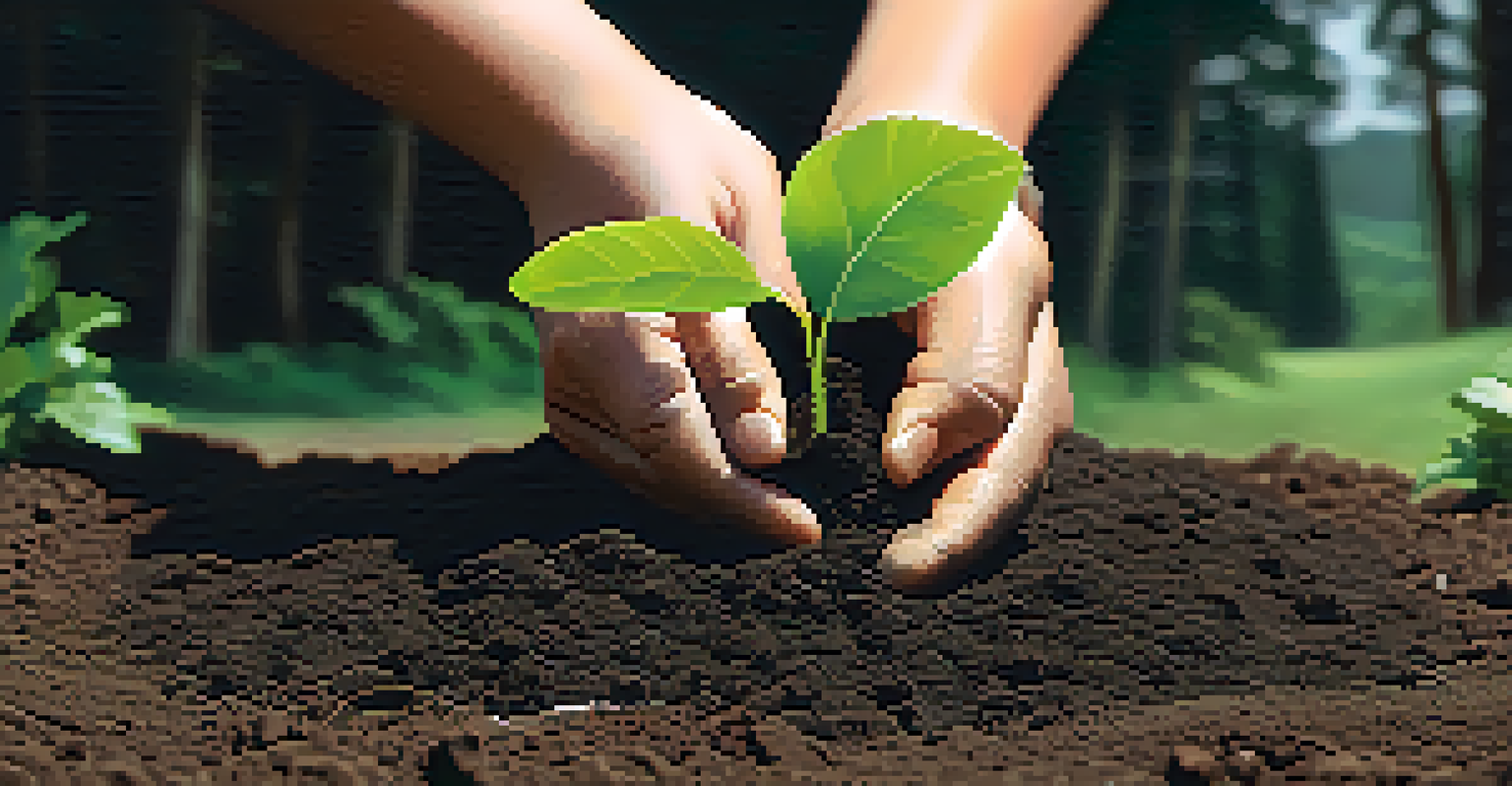Exploring Indigenous Spirituality and Its Influence on Heritage

Understanding Indigenous Spirituality: A Holistic Approach
Indigenous spirituality is deeply rooted in the relationship between people, nature, and the cosmos. It emphasizes a holistic worldview where every element of life is interconnected. This approach fosters a sense of responsibility towards the environment, reflecting a belief that all beings, whether human or non-human, possess a spirit and contribute to the web of life.
Indigenous spirituality is not just a belief system; it is a way of life that connects individuals to their ancestors, the land, and the cosmos.
At its core, Indigenous spirituality often involves traditions passed down through generations, encompassing rituals, stories, and teachings. These practices not only celebrate the natural world but also instill values of respect, balance, and harmony in everyday life. For example, many Indigenous communities engage in seasonal ceremonies that honor the cycles of nature, reinforcing their connection to the land.
By understanding Indigenous spirituality, we gain insights into how these beliefs shape identity and influence cultural practices. This perspective highlights the importance of preserving Indigenous knowledge, as it offers valuable lessons for sustainable living and environmental stewardship that are increasingly relevant in today’s world.
The Role of Ancestors in Indigenous Spirituality
Ancestors hold a prominent place in Indigenous spirituality, serving as guides and protectors for the living. This connection with ancestors is often expressed through rituals, storytelling, and community gatherings that honor their wisdom and experiences. By remembering and celebrating their lineage, Indigenous peoples maintain a sense of continuity and belonging that transcends time.

Many Indigenous cultures believe that ancestors continue to influence the present and future, offering insights and support in navigating life's challenges. For instance, during significant life events, such as births or marriages, rituals may be performed to invoke the presence of ancestors, seeking their blessings. This practice not only strengthens family bonds but also reinforces cultural identity.
Interconnectedness in Spirituality
Indigenous spirituality emphasizes the interconnectedness of all life, fostering a sense of responsibility towards nature and the environment.
The reverence for ancestors also plays a crucial role in preserving traditional knowledge and cultural practices. By passing down stories and teachings from one generation to the next, Indigenous communities ensure their heritage remains vibrant and relevant, fostering a deep appreciation for their unique histories and traditions.
Nature as a Sacred Entity in Indigenous Beliefs
In Indigenous spirituality, nature is often regarded as a sacred entity, deserving of respect and reverence. The belief that all elements of the natural world—trees, rivers, animals—possess their own spirits fosters a profound sense of interconnectedness. This perspective encourages a relationship with nature that goes beyond mere resource exploitation, promoting stewardship and conservation.
We cannot separate ourselves from the earth; we are part of it, and it is part of us. This understanding is at the heart of Indigenous spirituality.
Many Indigenous cultures have specific teachings about the land that guide how they interact with it. For example, the concept of 'Mother Earth' embodies the idea that the land nurtures and sustains life, and in return, humans must care for it. This reciprocal relationship is captured in various ceremonies that honor the earth, emphasizing gratitude and respect for its gifts.
By recognizing nature as sacred, Indigenous spirituality offers valuable lessons for environmental sustainability. As modern society grapples with climate change and ecological degradation, these teachings remind us of the importance of living in harmony with the earth, highlighting practices that promote balance and conservation.
Rituals and Ceremonies: Expressions of Spirituality
Rituals and ceremonies are integral to Indigenous spirituality, serving as meaningful expressions of cultural identity and community. These practices often mark significant life events, seasonal changes, or communal gatherings, allowing individuals to connect with their heritage and spirituality. Through songs, dances, and storytelling, communities celebrate their shared history and values.
For example, the potlatch ceremony among some Indigenous peoples of the Pacific Northwest is a rich tradition that involves feasting and gift-giving to honor relationships and redistribute wealth. Such ceremonies are not only social events but also spiritual practices that reinforce community ties and cultural heritage. They serve as a reminder of the interconnectedness of individuals and their responsibilities to each other.
Importance of Ancestors
Ancestors play a vital role in Indigenous spirituality, guiding communities through rituals and storytelling that reinforce cultural identity and continuity.
These rituals and ceremonies also provide a space for healing and reflection. By participating in communal practices, individuals can process grief, celebrate joy, and reinforce their spiritual beliefs. This collective experience fosters a sense of belonging and continuity within the community, ensuring that Indigenous spirituality remains a vibrant part of cultural heritage.
Language: A Vessel for Indigenous Spirituality
Language plays a crucial role in expressing Indigenous spirituality, as it encapsulates cultural knowledge and worldview. Many Indigenous languages contain unique phrases and terms that convey spiritual concepts, connecting speakers to their heritage and community. This linguistic connection highlights the importance of language preservation in maintaining spiritual practices and cultural identity.
For instance, certain Indigenous languages have words that reflect the relationship between people and the land, emphasizing respect and stewardship. When these languages are spoken, they carry the weight of ancestral knowledge and traditions, reinforcing the connection between past and present. This is why efforts to revitalize Indigenous languages are also seen as vital to preserving spiritual beliefs and practices.
Additionally, storytelling in Indigenous languages serves as a powerful tool for transmitting spiritual teachings. Elders often share stories that contain moral lessons and cultural values, helping younger generations understand their place within the larger tapestry of life. By weaving spirituality into language, Indigenous peoples ensure that their cultural heritage continues to thrive.
The Impact of Colonization on Indigenous Spirituality
Colonization has had a profound impact on Indigenous spirituality, often disrupting traditional practices and belief systems. Forced assimilation, land dispossession, and the suppression of spiritual expressions have led to a loss of cultural identity for many Indigenous communities. This historical trauma has created challenges in preserving and revitalizing spiritual practices.
Despite these challenges, many Indigenous peoples have demonstrated resilience and adaptability in maintaining their spiritual beliefs. Some have integrated elements of other faiths while striving to reclaim traditional practices, creating a unique blend that honors their heritage. For example, ceremonies may incorporate both Indigenous and Christian elements, illustrating a dynamic cultural evolution.
Resilience Amid Colonization
Despite the challenges of colonization, Indigenous peoples are actively reviving their spiritual practices, blending traditions while honoring their heritage.
Today, there is a growing movement among Indigenous communities to revive and celebrate spiritual traditions. By reclaiming their spiritual practices, they not only honor their ancestors but also foster healing and empowerment within their communities. This resurgence of Indigenous spirituality is a testament to the strength and resilience of these cultures in the face of adversity.
The Future of Indigenous Spirituality and Heritage
As we look to the future, Indigenous spirituality remains a vital aspect of cultural heritage that offers valuable insights for modern society. The emphasis on interconnectedness, respect for nature, and community values can guide us in addressing contemporary challenges, such as environmental degradation and social inequality. By learning from Indigenous perspectives, we can cultivate a more holistic approach to living.
Furthermore, the revival of Indigenous spirituality is increasingly recognized as essential for personal and communal healing. Many people, both Indigenous and non-Indigenous, seek to reconnect with nature and explore spiritual practices that promote well-being and mindfulness. This growing interest in Indigenous teachings provides an opportunity for cultural exchange and mutual understanding.

Ultimately, the future of Indigenous spirituality lies in the hands of younger generations who carry the responsibility of preserving and revitalizing these traditions. By engaging with their cultural heritage and integrating it into modern life, they can ensure that Indigenous spirituality continues to thrive, enriching not only their own lives but also the wider world.